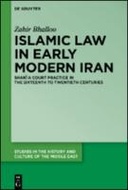Explore

Historical studies on the practice of Islamic law (sharīʿa) tend to focus on practice in a Sunni setting during the Mamluk or Ottoman periods. This book decenters Sunni and Mamluk and Ottoman normativity by investigating the practice of sharīʿa in a Twelver Shiʿi Persian-speaking milieu, in early modern Iran between the sixteenth to twentieth centuries. Drawing on documentary evidence and narrative sources, it reconstructs who the practitioners of Islamic law were, how they authenticated, annulled, and archived legal documents, and how they intervened in the resolution of disputes over religious endowments (waqf). The study demonstrates that following Iran's conversion to Twelver Shiʿism under the Safavids, the dominance of Uṣūlī Shiʿi legal theory, which conferred judicial authority on scholars recognized as Shiʿi jurists (mujathids), affected both the practitioners of Islamic law and the procedures of sharīʿa court practice in Iran. Shiʿi jurists in Iran, as a result, would come to exercise by the end of the nineteenth century a judicial monopoly over valid sharīʿa court practice thus laying the foundation for Ayatollah Khomeini's extension, during the Iranian revolution, of the authority of the Shiʿi jurist over political affairs. ; Historical studies on the practice of Islamic law (sharīʿa) tend to focus on practice in a Sunni setting during the Mamluk or Ottoman periods. This book decenters Sunni and Mamluk and Ottoman normativity by investigating the practice of sharīʿa in a Twelver Shiʿi Persian-speaking milieu, in early modern Iran between the sixteenth to twentieth centuries. Drawing on documentary evidence and narrative sources, it reconstructs who the practitioners of Islamic law were, how they authenticated, annulled, and archived legal documents, and how they intervened in the resolution of disputes over religious endowments (waqf). The study demonstrates that following Iran's conversion to Twelver Shiʿism under the Safavids, the dominance of Uṣūlī Shiʿi legal theory, which conferred judicial authority on scholars recognized as Shiʿi jurists (mujathids), affected both the practitioners of Islamic law and the procedures of sharīʿa court practice in Iran. Shiʿi jurists in Iran, as a result, would come to exercise by the end of the nineteenth century a judicial monopoly over valid sharīʿa court practice thus laying the foundation for Ayatollah Khomeini's extension, during the Iranian revolution, of the authority of the Shiʿi jurist over political affairs.
This book is included in DOAB.
Why read this book? Have your say.
You must be logged in to comment.
